Illegal e-motorbike riders 'goading' police, force says
Electric motorbikes may be an increasingly popular way to get around but have been blamed for terrorising neighbourhoods with anti-social and dangerous riding.
They have also been involved in two high-profile incidents in Cardiff and Salford in which young people have died.
The BBC has been out on patrol with police officers in Bristol to see how they are tackling the rise in illegal use.
"They're going about 80 miles an hour, doing wheelies and shouting abuse at people while they're doing it.
"I'm too scared to take my own babies out because of it, in case they get hit or something.
"It's been the same now for two years and I can't stick it anymore, I want to leave."
Bobby, a mum of three young children, is totally fed up with electric motorbikes and sees them as a scourge upon Hartcliffe in Bristol, where she lives.
She says high-speed electric motorbikes tear through the community at dangerous speeds, making her worried for her children's safety.
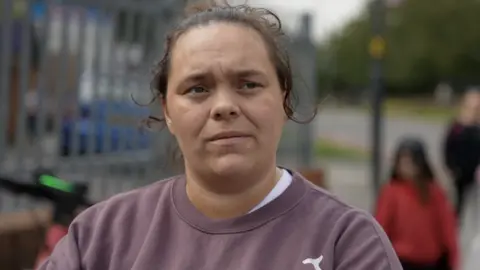
But it is not only residents who are frustrated - the very nature of the bikes and how they are being used is proving a challenge to police.
Electric motorbikes are more powerful than regular e-bikes, which have their speed limited.
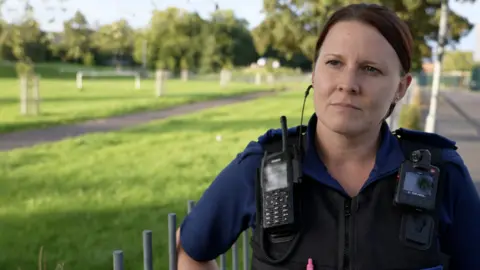
They're only road legal if they are registered, taxed, insured and ridden wearing a helmet. Those on the streets of Hartcliffe mostly aren't.
"It's a huge issue," says PCSO Hannah Cheney.
"The best way to describe it is relentless."
Many of the riders have no helmets on, and are travelling at high speed, able to escape down alleyways and paths if pursued.
"They're literally asking us to chase them," says Police Community Support Officer Mark Thomas who is in the passenger seat as we go out on patrol.
Another bike crosses the path of driver Sgt Rich Higbey's patrol car and races almost silently up the hill.
He stands little chance of keeping up or catching the shadowy figure zooming off into the distance.
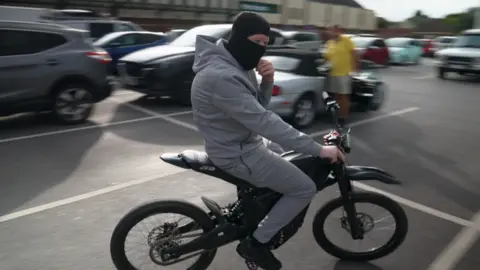
"He's goaded us to go that way, we've followed him and then he's just pulled up and hidden away," says PCSO Thomas.
"It's a game" he says, exasperated.
"They're getting us to chase our tails".
It's a tricky area of policing that's become highly controversial.
Young people have died after being followed by police but there have also been deaths when the police weren't involved.
In Cardiff, a riot broke out in May after two teenagers died riding an electric motorbike - a Sur-Ron.
Harvey Evans, 15, and Kyrees Sullivan, 16, had been followed by a police van shortly before they crashed.
Two South Wales Police officers are still under investigation.
Fifteen-year-old Saul Cookson died in Salford in June after being followed by police.
Again, the Independent Office for Police Conduct is investigating.
Communities want action but officers are cautious and aware of the risks.
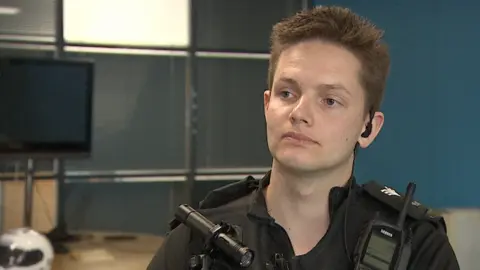
There is a sense that the law and police pursuit guidance are being left behind by rapidly developing technology.
"It's a total loss," declares Sgt Rich Higbey over the radio, giving up another chase in frustration.
That's police speak for another bike which has got away, another hooded teenager vanishing into the maze of Bristol's Hartcliffe estate.
"I fully appreciate the public perception isn't great," Sgt Higbey said.
"People see these offences happen, they see these bikes blasting past popping wheelies - you name it, they're doing it.
"There's a lot of Sur-Ron bikes driving anti-socially and just antagonising people.
"But people have to understand we can't always pursue them."
The reasons are made clear at the briefing ahead of the shift.
'Tragic consequences'
Operation Broad brings together Avon and Somerset Police traffic officers, neighbourhood teams, and specialist equipment like drone cameras and officers riding off-road motorbikes - all to clamp down on illegal and anti-social use of electric bikes and scooters.
"You'll all be aware of the incidents that took place in Cardiff and Salford," Sgt Higbey reminds his colleagues.
"Two cases have ended with tragic consequences for everyone involved, with a suggestion officers had been following these vehicles."
The estate in Hartcliffe is not unique - far from it.
As electric motorbikes surge in popularity, they're being used to tear through more communities across the country.
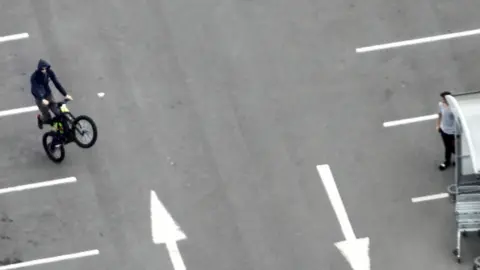
In Hartcliffe, we managed to get one of the young riders to stop and talk.
"It's fun for me, I like the thrill of it," he says, speaking with a heavy Bristol accent from behind a balaclava.
He acknowledges his electric motorbike isn't legal on the road and says he's had four bikes seized by the police.
"It's your choice if you want to get one, if you want to take the risk.
"That's what I'm doing, I'm taking the risk. I know it could get taken (by the police) like that," he says, clicking his fingers.
He tells me he's used to being chased by the police. Then I ask what the key is to getting away: "Lanes, little lanes. Little alleyways".
Powerful drone cameras are harder to escape from and Avon and Somerset's own police Sur-Ron bike is now part of the armoury, helping officers keep up the chase.
But still, many want clearer guidance and more action.
"We have to bear in mind, they're young riders, they might not be experienced on that bike," Sgt Higbey tells me.
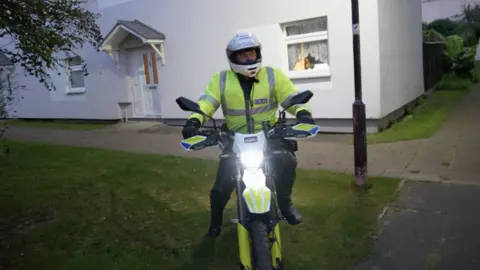
"Therefore, if a police vehicle was to get behind them, they might come off.
"We have to be proportionate and realistic in how we're dealing with it and if that means letting them go and identifying them later, then so be it - we'll have to do that."
Often the bikes are illegally modified to reach speeds of 60-70 miles an hour - faster than the manufacturers' intended capability.
Nichola, who was out shopping on the estate, sums up the situation: "I think the police's hands are tied because if they chase them and anything happens to the kids, they're in the wrong.
"But if they don't chase them or do something, they're also in the wrong. So I don't think the police can win."
Sgt Higbey tells me: "It does need to change, we need to get the results a little bit clearer.
"We need to start prosecuting people, we need the results from the courts, we need something to start showing that we mean business and we're not going to take it anymore."


How have you been affected by electric motorbikes in your area? Email: haveyoursay@bbc.co.uk
Please include a contact number if you are willing to speak to a BBC journalist. You can also get in touch in the following ways:
- WhatsApp: +44 7756 165803
- Tweet: @BBC_HaveYourSay
- Upload your photos/videos here
- Or fill out the form below
- Please read our terms & conditions and privacy policy
If you are reading this page and can't see the form you will need to visit the mobile version of the BBC website to submit your question or comment or you can email us at HaveYourSay@bbc.co.uk. Please include your name, age and location with any submission.

Follow BBC West on Facebook, X and Instagram. Send your story ideas to: bristol@bbc.co.uk

Sign up for our morning newsletter and get BBC News in your inbox.

